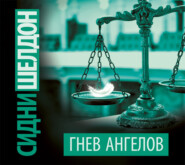По всем вопросам обращайтесь на: info@litportal.ru
(©) 2003-2025.
✖
The Stars Shine Down
Автор
Год написания книги
2018
Настройки чтения
Размер шрифта
Высота строк
Поля
There never was knight like the young Lochinvar.
And the glorious poem went on to tell how Lochinvar risked his life to rescue his beloved, who was being forced to marry another man.
So daring in love, and so dauntless in war, Have ye e’er heard of gallant like young Lochinvar?
Some day, Lara thought, a handsome Lochinvar will come and rescue me.
One day Lara was working in the kitchen, when she came across an advertisement in a magazine, and her breath caught in her throat. It showed a tall, handsome man, blond, elegantly dressed in tails and white tie. He had blue eyes and a warm smile, and he looked every inch a prince. That’s what my Lochinvar will look like, Lara thought. He’s out there somewhere, looking for me. He’ll come and rescue me from here. I’ll be at the sink washing dishes and he’ll come up behind me, put his arms around me, and whisper, ‘Can I help you?’ And I’ll turn and look into his eyes. And I’ll say, ‘Do you dry dishes?’
Bertha’s voice said, ‘Do I what?’
Lara whirled around. Bertha was standing behind her. Lara had not realized she had spoken aloud.
‘Nothing,’ Lara blushed.
To Lara, the most fascinating dinner conversations revolved around the stories of the notorious Highland Clearances. She had heard them told over and over but could never get enough of it.
‘Tell me again,’ she would ask. And Mungo McSween was eager to oblige …
‘Weel, it began in the year 1792 and it went on for more than sixty years. At first they called it Bliadhna nan Caorach – The Year of the Sheep. The landowners in the Highlands had decided that their land would be more profitable with sheep than with tenant farmers, so they brought flocks of sheep into the Highlands, and found that they could survive the cold winters. That was when the clearances began.
‘The cry became, “Mo thruaighe ort a thir, tha’n caoraich mhor a’ teachd!” Woe to thee, oh land, the Great Sheep is coming. First there were a hundred sheep, then a thousand, then ten thousand. It was a bloody invasion.
‘The lairds saw riches beyond their dreams, but they maun get rid of the tenants first, who worked their wee patches of land. They had little enough to begin with, God knows. They lived in sma’ stone houses with na chimneys and na windows. But the lairds forced them out.’
The young girl was wide-eyed. ‘How?’
‘The government regiments were ordered to attack the villages and evict the tenants. The soldiers wad come to a little village and gie the tenants six hours to remove their cattle and furniture and get oot. They maun leave their crops behind. Then the soldiers burned their huts to the ground. More than a quarter of a million men, women and children were forced frae their holdings and driven to the shores of the sea.’
‘But how could they drive them from their own land?’
‘Ah, they niver owned the land, you see. They had the use of an acre or two frae a laird, but it was niver theirs. They paid a fee in goods or labour in order to till the land and grow some tatties and raise a few cattle.’
‘What happened if the people wouldn’t move?’ Lara asked breathlessly.
‘The old folk that didn’t get out in time were burned in their huts. The government was ruthless. Och, it was a terrible time. The people had naething to eat. Cholera struck, and diseases spread like wildfire.’
‘How awful,’ Lara said.
‘Aye, lassie. Our people lived on tatties and bread and porridge, when they could git it. But there’s one thing the government could nae take away frae the Highlanders – their pride. They fought back as best they could. For days after the burning was over, the homeless people remained in the glen, trying to salvage what they could from the ruins. They put canvas over their heids for protection agin the night rain. My great-great-grandfather and my great-great-grandmother were there and suffered through it all. It’s part of our history, and it’s been burned into our very souls.’
Lara could visualize the thousands of desperate, forlorn people robbed of everything they possessed, stunned by what had happened to them. She could hear the crying of the mourners, and the screams of the terrified children.
‘What finally happened to the people?’ Lara asked.
‘They left for other lands on ships that were death traps. The crowded passengers died of fever or frae dysentery. Sometimes, the ships would hit storms that delayed them for weeks, so they ran out of food. Only the strong were still alive when the ships landed in Canada. But once they landed here, they were able to hae somethin’ they niver had before.’
‘Their own land,’ Lara said.
‘That’s right, lass.’
Some day, Lara thought fiercely, I will have my own land, and no one – no one – will ever take it away from me.
On an evening in early July, James Cameron was in bed with one of the whores at Kirstie’s Bawdy House, when he suffered a heart attack. He was quite drunk, and when he suddenly toppled over, his playmate assumed he had simply fallen asleep.
‘Oh, no, you don’t! I have other customers waitin’ for me. Wake up, James! Wake up!’
He was gasping for breath and clutching his chest.
‘For Gude’s sake,’ he moaned, ‘git me a doctor.’
An ambulance took him to the little hospital on Quarry Street. Dr Duncan sent for Lara. She walked into the hospital, her heart pounding. Duncan was waiting for her.
‘What happened?’ Lara asked urgently. ‘Is my father dead?’
‘No, Lara, but I’m afraid he’s had a heart attack.’
She stood there, frozen. ‘Is he … is he going to live?’
‘I don’t know. We’re doing everything we can for him.’
‘Can I see him?’
‘It would be better if you came back in the morning, lass.’
She walked home, numb with fear. Please don’t let him die, God. He’s all I have.
When Lara reached the boarding house, Bertha was waiting for her. ‘What happened?’
Lara told her.
‘Oh, God!’ Bertha said. ‘And today is Friday.’
‘What?’
‘Friday. The day the rents have to be collected. If I know Sean MacAllister, he’ll use this as an excuse to throw us all out into the streets.’
At least a dozen times in the past when James Cameron had been too drunk to handle it himself, he had sent Lara around to collect the rents from the other boarding houses that Sean MacAllister owned. Lara had given the money to her father, and the next day he had taken it to the banker.
‘What are we going to do?’ Bertha moaned.
And suddenly Lara knew what had to be done.
‘Don’t worry,’ she said. ‘I’ll take care of it.’
In the middle of supper that evening Lara said, ‘Gentlemen, would you listen to me, please?’ The conversations stopped. They were all watching her. ‘My father has had a … a little dizzy spell. He’s in the hospital. They want to keep him under observation for a bit. So, until he comes back, I’ll be collecting the rents. After supper, I’ll wait for you in the parlour.’
‘Is he going to be all right?’ one of the boarders asked.

















